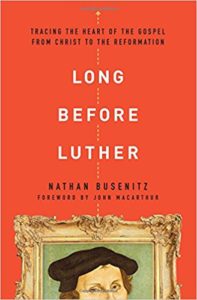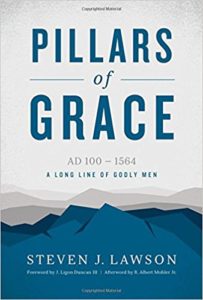Book Reviews for 4-20-18
 Why We’re Protestant An Introduction to the Five Solas of the Reformation
Why We’re Protestant An Introduction to the Five Solas of the Reformation
By: Nate Pickowicz
How do you discern true vs. false Christianity? In the days of the Protestant Reformation, the core tenets of the faith were strenuously examined. In the end, the Reformers maintained that at the heart of the Christian faith stood five main credos: sola Scriptura, sola gratia, sola fide, solus Christus, and soli Deo gloria. This book examines these five “solas” and makes a definitive case for why we’re Protestant.
 Long Before Luther: Tracing the Heart of the Gospel From Christ to the Reformation
Long Before Luther: Tracing the Heart of the Gospel From Christ to the Reformation
By: Nathan Busenitz
Where was the gospel before the Reformation?
Contemporary evangelicals often struggle to answer that question. As a result, many Roman Catholics are quick to allege that the Reformation understanding of the gospel simply did not exist before the 1500s. They assert that key Reformation doctrines, like sola fide, were nonexistent in the first fifteen centuries of church history. Rather, they were invented by Martin Luther, John Calvin, and others.
That is a serious charge, and one that evangelicals must be ready to answer. If an evangelical understanding of the gospel is only 500 years old, we are in major trouble. However, if it can be demonstrated that Reformers were not inventing something new, but instead were recovering something old, then key tenets of the Protestant faith are greatly affirmed. Hence, the need for this book.
After reading Long Before Luther, readers will:
- Possess a greater understanding of church history and the role it plays in the church today.
- Have a deeper appreciation for the hard-won victories of the Reformation.
- Be equipped to dialogue with Catholic friends about the presence of Reformed doctrines throughout church history.
- Feel renewed gratefulness for the unearned nature of grace and the power of the gospel.
 Pillars of Grace (Long Line of Godly Men Profile) AD 100-1564
Pillars of Grace (Long Line of Godly Men Profile) AD 100-1564
By Steven Lawson
The doctrines of grace are often known as the five points of Calvinism, but they were not the invention of John Calvin or his reforming cohorts of the sixteenth century. Rather, they are biblical doctrines, as Dr. Steven J. Lawson demonstrates in his book Foundations of Grace. Now, in Pillars of Grace, Dr. Lawson shows that the doctrines of grace have been understood and taught—sometimes in embryonic form, sometimes with great clarity—throughout church history. From the time of the early church fathers to the era of the Reformers, key men in the church stood on the foundation of Scripture and upheld the truth of God’s sovereign role in salvation. The inescapable conclusion is that the doctrines of grace are no innovation, but the consistent witness of some of the greatest men of the church.
